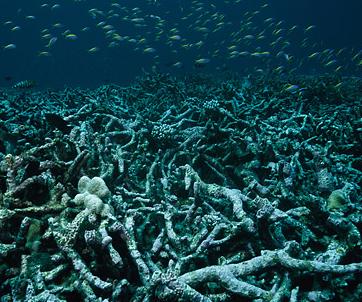Course:ECON371/UBCO2010WT1/GROUP1/Article7
Back to
Group 1
Article 7: Dead Coral Found Near Site of Gulf Oil Spill
Summary
This article illustrates the impact of the BP oil spill on marine life. A team of scientists recently found evidence of dead and dying corals, seven miles southwest of the site of the Deep Water Horizon oil spill. Charles Fisher, the chief scientist on the gulf expedition, explained that the presence of oil plumes in the area, the vicinity to the well, and the recent nature of the die-off, are ample evidence that the spill is to be blamed for this.
With the discovery of the dead corals, it is evident that the oil from the spill has caused harm to marine life in the deep ocean. Even though oil seeps naturally from the seafloor throughout the Gulf of Mexico, it is unlikely to have caused such a severe coral die-off. In order to further prove their point ,the scientists took samples from the site, to test for the presence of hydrocarbons and dispersants.
Other coral sites near the well, as well as sites further from the well, have not suffered any visibile damage. The scientists will continue to explore the ocean floors near the site, to see if there any sublethal effects of the spill on the corals.
Two pictures showing an example of when coral reefs are alive (left) and dead (right).
Analysis of Article
Although the cause of massive coral die-off may or may not be directly related to the oil spill, the oil spill must have cause direct consequences to at least some of the surrounding sea areas; in fact, the environment as a whole has definitely been damaged by the oil spill. This massive die-off of coral may be one of the alarms of how serious environmental pollution is and why we should continue to actively monitor and evaluate the impact of the spill in the gulf precisely.
Although the article focuses on what caused the death of the coral reefs, it is also important to address the monetary liability of the persons to blame, and where these funds should be applied. Since it is near the international water, the federal government of Mexico and possibly other countries will settle this dispute in court with BP executives. The Mexican federal governments argue that given the recent catastrophic events, it is most likely that BPs oil spill caused the destruction of the coral reefs. Because of the ambiguity surrounding Gulf of Mexico spill and who is at fault, it is likely that BP will not be held as solely responsible for the damages. The exact distribution of liabilities is a matter for numerous hours of courtroom sessions to decide.
The coral reef along the coast of Mexico brings up an issue relating to property rights in international waters. Since the international water is essentially a global public good, people will have the tendency to free-ride and abuse its benefits. For example, in this case because the damages are done in international water, BP does not hold full responsibility for the total damages done within the last couple of months. Thus BP will likely argue that because this is in international waters, there are other potential polluters that may be contributing to the damage. Therefore, it is only fair that BP pay a fraction of the total damages done in relate to the oil spills.
The potential death of many coral reefs is a sunk cost and Mexican governments are looking for someone to pay for their loss. Naturally, BP has paid for the catastrophic emission; however a new abatement cost arises. Thus the Mexican governments demand additional payments for repairing the damage done. The evidence, for now, is circumstantial; it has yet to be scientifically proven that BPs oil spill is responsible for the death of the coral reefs, so whether BP pays for the abatement cost depends on the evidence supplied by both sides in a court dispute.
It is likely that the Environmental Protection Agency (EPA) will also attend this court dispute because coral reefs are considered to be very valuable. The loss of many coral reefs can be considered catastrophic, and will be evaluated by EPA to be very costly, since coral reefs are home to a large portion of marine species. Because of the destruction of so much habitat, the EPA will add an additional cost.
Assuming that Mexico wins the court dispute, BP will have to the pay additional abatement cost and Mexico will generally be better off. However, because coral reefs are scarce resources, irreplaceable and valued high at the international price, the payment will not entirely cover the damages done. For example, coral reefs are home to roughly one quarter of all marine species, thus the fishing and tourist industries will suffer in the long run, which BP would likely not have paid for. On the demand and supply graph, the supply curve for these goods will shift left and the new intersection will be at a higher price and lower output.
Conclusions
The BP oil spill is currently being seen as culpable for the environmental degradation of the deep-water coral. This allows a clear example that more studies are needed to be conducted to the surrounding area to fully understand the impact of off-shore oil spills.
The coral reef damaged is located in international waters and will be disputed within the courts to determine who is at fault for the damage done towards the coral reef. The Mexican government is currently looking for compensation in regards to the damage done. This court case between BP and the Mexican government will definitely be interesting to follow. If the BP Company did lose the case against the government, they will have to pay a large amount to compensate for the loss of natural resource.
The studies conducted and court case will allow the regulations, policies in regards to off-shore oil spills to develop more fully and better represent the actual costs of a such a catastrophic oil spill. The delay between the spill and the finding of these reefs also shows that the full impact of such a deadly spill takes time to be discovered. The full impact of the oil spill will likely not be known for quite some time. By the time that impact is known, it may be quite obvious that the parties responsible have not paid anywhere near enough reparations for the damage they caused.
Prof's Comments
I like your emphasis on the liability issue. However, the part of the Gulf where the spill occurred is in US territory. The US government is the government involved. I also like your discussion of the difficulty of getting anything done if it is international. You could have mentioned the court costs a bit more, in the sense that if the court costs are high, it will probably prevent us from attaining the efficient outcome.

